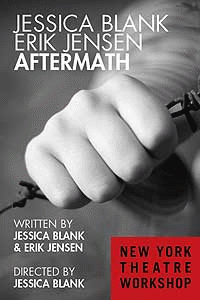The documentary drama "Aftermath" has now extended its run at New York Theatre Workshop through October 18th. "Aftermath" tells the stories of eight Iraqi refugees, essentially in their own words. Erik Jensen and Jessica Blank, who also directs, have agreed to answer questions via e-mail between shows. Welcome to OpEdNews. Can you tell our readers where the idea for this play came from?
The initial seed for "Aftermath" was hatched at New York Theater Workshop's annual summer residency at Dartmouth College. Jessica was there working on another play, "Liberty City"--one day at breakfast, she and NYTW's artistic director, Jim Nicola, were talking about the fact that there hadn't been any work done in the contemporary American theater about either of the wars that America is involved in, from the civilians' point of view. There had been plays created from the soldiers' points of view (though perhaps not enough), and from the points of view of the policy-makers, but nothing that got at what it is to be a regular person who just happens to live where the war is being played out.
We had previously written the documentary play "The Exonerated," based on interviews we conducted with exonerated death row inmates, and were searching for subject matter for our next documentary play. After Jessica returned from Dartmouth, we started talking about this as a potential subject, and refined the idea. Meanwhile, we continued to talk with NYTW's artistic staff about it, and by last June, NYTW secured a grant from the Ford Foundation to send us to Jordan to do the interviews for the piece.
You interviewed 35 refugees during the two weeks you were in Jordan. How did that go? Did you run into problems being Americans?
After 25 years under Saddam, it seemed that there was a pervasive and visceral understanding, on the part of Iraqi civilians, that there is a significant difference between the policies of a government and the people of a country. This was enormously moving and instructive to us, and we realized that the simple act of speaking to each other, Iraqi civilian to American civilian, was an important part of the play.
In "Aftermath," you let the refugees speak for themselves. Was that a risky choice?
The play contains a translator character, who is a composite of several different translators we worked with in Jordan (the other characters are not composites and are direct representations of individuals we met). We allowed ourselves slightly more dramatic license with the translator, simply because he was a composite and serves as the bridge between the audience and the other characters, but he speaks for himself as well--about the experience of being a translator in Iraq and the particular struggles associated with trying to bridge two worlds-- and is not a mouthpiece for our point of view.
Some people might see it as risky to give voice to Iraqis in their own words, since there is cultural pressure on us as Americans to see them as "other," dangerous, alien--but we don't see it that way. We connected with each individual Iraqi we met on a deep and human level and believe that when American audiences hear them speak for themselves, they will connect with those stories on a human level as well.
You consciously chose actors of Middle Eastern background for this play. Why was that so important to you ?
it would be sloppy (not to mention problematic) of us to treat those cultures as equivalent or interchangeable. It would have been impossible to hire an entirely Iraqi-American cast--there aren't enough actors in New York City of Iraqi descent--but the fact that our cast all has family background from the basic geographic region enables them to bring a sense of cultural specificity, rhythm, language and gesture to the piece that we believe is an integral part of the play.
That makes perfect sense to me. You're enjoying back-to-back successes with "The Exonerated" and "Aftermath." Did your wild success with "The Exonerated" open doors for you this time? Or did it put more pressure on you to succeed?
To our mind, we've succeeded if we've translated the powerful experience that we had hearing these stories in the interview room skillfully enough that our audiences can have a similar experience watching the play in the theater, and if we've faithfully communicated the personal stories of the people who appear in the play, as well as the larger story we heard in all the interviews that didn't make it into the final piece.
(Note: You can view every article as one long page if you sign up as an Advocate Member, or higher).






